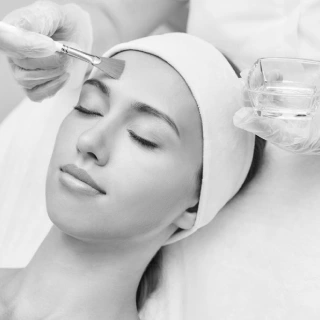Chemical Peels
Chemical Peels
A chemical peel delivers a uniform skin tone, smoother texture, and effectively reduces age spots, sun spots, fine lines, and wrinkles.
Unlike routine salon peel facials, chemical peels penetrate deeper layers of the skin, resulting in a revitalized and naturally radiant complexion. Anticipate a refreshed appearance and noticeable enhancements in skin texture after undergoing this treatment.
Ideal candidates for chemical peel treatment include those with realistic expectations for varying outcomes from person to person. Additionally, candidates should be in good overall health and free from skin infections, cuts, skin diseases, or sunburns.

Procedure
The chemical peeling procedure commences with the application of a defatting solvent, uniformly applied and then removed from the targeted skin area. Subsequently, the peeling solution is applied for a specified duration, followed by the application of a neutralizing solution. Patients are typically able to return home on the same day.
Benefits
- Chemical peels promote exfoliation, removing dead skin cells and renewing the skin’s outer layer for a fresher look.
- Effective in addressing hyperpigmentation issues, chemical peels target dark spots, sun damage, and uneven skin tone.
- By stimulating collagen, chemical peels contribute to the reduction of fine lines, fostering smoother and more youthful skin.
- Chemical peels help treat acne and minimize the appearance of acne scars by unclogging pores and supporting skin healing.
- These peels improve skin texture, making it smoother, and promote a more even skin tone for a rejuvenated appearance.
- Chemical peels stimulate collagen production, enhancing skin elasticity and firmness, ultimately contributing to a more youthful complexion.
Recovery
The full results will become apparent within a few days to weeks in some cases. Initially, the treated skin may appear red and swollen, but over time, these side effects will subside. Following the doctor’s recommendations, lotions and creams should be applied, and sunscreen must be used to shield the skin from UV rays. It’s advisable to avoid makeup, as cosmetic products may cause irritation to sensitive skin. Regular follow-up appointments should be maintained for the plastic surgeon to monitor the skin’s progress consistently.
